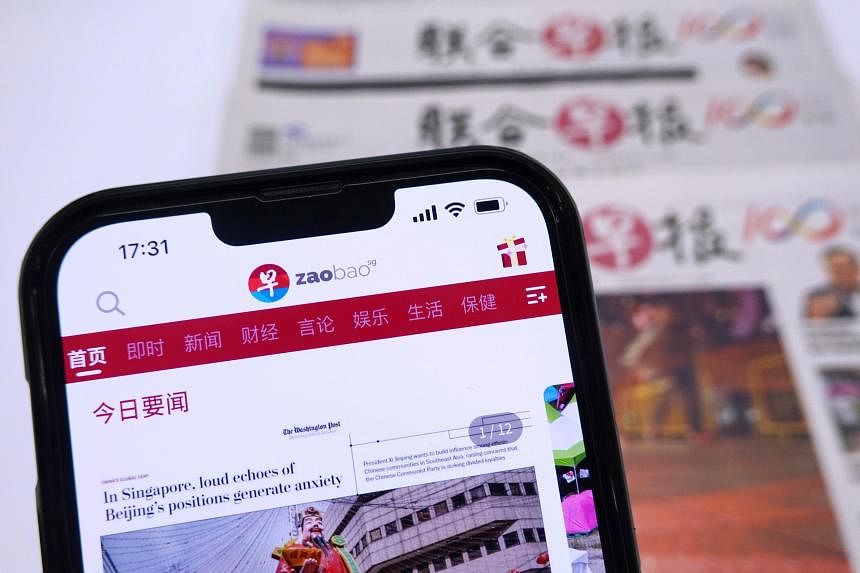SINGAPORE
Wrong to allege Zaobao echoes Beijing propaganda, S’pore envoy to US Lui Tuck Yew tells Washington Post
Lianhe Zaobao rejected the Washington Post's claims that it routinely echoed Beijing's "falsehoods", and prioritised its access to China.
ST PHOTO: STEPHANIE YEOW
Magdalene Fung
Deputy Foreign Editor
ST
The Singapore Government has issued a strong rebuttal to a report by The Washington Post alleging that Chinese-language media Lianhe Zaobao is pushing China’s propaganda and falsehoods.
Singapore Ambassador to the United States, Mr Lui Tuck Yew, said the Post’s July 24 article titled “In Singapore, loud echoes of Beijing’s positions generate anxiety” wrongly suggests that Zaobao echoes Beijing’s propaganda.
“Singapore’s mainstream media, including Lianhe Zaobao, reflect our distinct societal concerns, cultural history and perspectives. They report local and global news for Singaporeans and play a crucial role in preserving the voices of our multicultural communities,” Mr Lui wrote in a July 26 letter addressed to the Post’s editor, after the article ran.
The letter was posted on Saturday on the website of Singapore’s US embassy in Washington.
Mr Lui said that in his former role as Singapore Ambassador to China, he often heard Zaobao’s readers of various nationalities affirm the paper’s balanced coverage and uniquely Singaporean viewpoints.
“I’m therefore not surprised that Lianhe Zaobao has categorically rejected how it was wrongly portrayed in the article and clearly explained its editorial stance,” he said
The Ambassador said it bears repeating that Singapore conducts its foreign policy based on the country’s own interests – a position that enjoys strong public support
“We do not pick sides but uphold consistent principles,” he said.
“It is misguided for American news outlets to expect Zaobao to resemble the Washington Post, or for Singapore to follow either the United States or China. Our media and society are unique, and offer valuable perspectives that contribute to the global dialogue,” Mr Lui said.
The Washington Post article posits that Beijing is using ethnic Chinese communities abroad as a tool to achieve its geopolitical ambitions. In particular, it accuses Zaobao of routinely echoing “some of Beijing’s most strident falsehoods, including denying evidence of rights abuses in Xinjiang”, and of prioritising its continued “access (to mainland Chinese readers) over critical coverage (of China)”.
In a statement provided to the Post prior to the article’s publication, the Ministry of Communications and Information (MCI) said its data “suggests Singapore’s media provide a balanced perspective that is trusted by Singaporeans”.
Polling done by MCI has also consistently shown that Singaporeans understand the need for an independent foreign policy, it said.
The ministry noted a July 2022 poll that showed 86 per cent of Singaporeans felt the Government should always act in Singapore’s best interest and not take sides between the US and China. Only 4 per cent felt Singapore should lean towards China, and another 4 per cent felt the Republic should lean towards the US.
“Polling conducted since 2018 has consistently found a significant majority comfortable with the state of our relations with both the US and China,” MCI said in the statement.
The proportion satisfied with Singapore’s ties with China ranged from 49 per cent in 2018 to 58 per cent now, while those satisfied with Singapore’s ties with the US ranged from 61 per cent in 2018 to 69 per cent currently.
The Post had partially cited MCI’s statement at the end of its report, but has not responded to the Ministry of Foreign Affairs’ requests to publish Ambassador Lui’s letter.
The Post’s report, by Singapore-based correspondent Shibani Mahtani and photographer Amrita Chandradas, argues that Beijing is influencing the sentiments of ethnic Chinese communities beyond its shores, particularly in South-east Asia, using them as an instrument towards realising its geopolitical ambitions.
The article singled out Zaobao, accusing the paper of routinely echoing “some of Beijing’s most strident falsehoods, including denying evidence of rights abuses in Xinjiang and alleging that protests in Hong Kong and in mainland China were instigated by ‘foreign forces’”.
The report said its conclusions were derived after examining more than 700 Zaobao articles through 2022 and early 2023.
A day after the Post published its report, Zaobao on July 25 put up on its website a comprehensive response – in Chinese and English – that it had earlier provided to the Post addressing the questions raised in the US daily’s article.
Zaobao editor Goh Sin Teck said in a short accompanying statement that the responses “were not adequately reflected” in the Post’s reporting.
“The Washington Post has selectively left out some facts while intentionally highlighting and putting together some information, and citing anonymous former and current journalists to paint a negative image of Lianhe Zaobao, which is regrettable but not surprising to us,” he said.
“Amid the current international geopolitical situation, the idea that ‘if you are not with us, you are against us’ is spreading. Now more than ever, Lianhe Zaobao believes that we should not be pressured by anyone into changing our editorial direction. We remain committed to staying objective; we will not be pressured by any party, and do not wish to be embroiled in China-US rivalry.”MORE ON THIS TOPIC
Lianhe Zaobao strongly refutes ‘biased comments and unfair statements’ in Washington Post article
Debate not whether the US or China is right, but what is right for Singapore
Mixed views in Asia on US’ and China’s influence in the region: Poll
Not pro-West, pro-China, pro-Ukraine or pro-Russia, just pro-Singapore
No comments:
Post a Comment